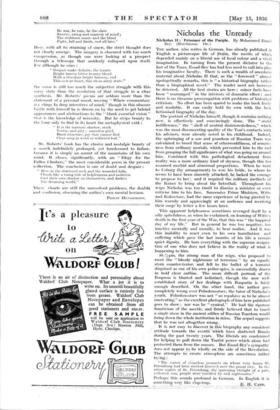Nicholas the Unready
THE author, who writes in German, has already published in English a picturesque life of Stalin, the merits of which depended mainly on a liberal use of local colour and a vivid imagination. In turning from the present dictator to the last of the Tsars, Essad-Bey has had less need to call into play his imaginative faculty. There is such a wealth of anecdotic material about .Nicholas that, as the " foreword " almost apologetically. remarks, this is " a histOrical biography rather than a- biographical novel." The reader need not however be deterred.. All the best stories are. here; minor facts have been " rearranged " in the interests of dramatic effect ; and there is no tiresome preoccupation with problems of historical criticism. ' No effort has been spared to make the book lively and readable. It can easily hold its own with the best fietionised biography of the day.
The portrait of Nicholas himself, though it contains nothing new, is effectively and convincingly done. The " stolid indifference," the " shell of neutral disinterestedness," which was the most disconcerting quality of the Tsar's contacts with his advisers, were already noted in his childhood. Indeed, the upbringing of a son and grandson of Russian TsSrs was calculated to breed that sense of otherworldliness, of remote. ness from ordinary mortals, which prevented him to the end from grasping the full_ significance of what was going on around him. combined with this pathologiCal detachment from reality was a more ordinary kind of shyness, though this too assumed morbid and abnormal proportions. When he went to Coburg (by arrangement) to woo his bride, to whom he seems to have been sincerely attached, he lacked the courage to propose to her ; and it required the military methods of the Kaiser to bring about the betrothal. Throughout his reign Nicholas was too timid to dismiss a minister or even criticise him to his face. Successive Prime Ministers, Witte and Kokovtsov, had the same experience of being greeted by him warmly and approvingly at an audience and receiving their conge by letter a few hours later.
This apparent helplessness sometimes revenged itself by a silly spitefulness, as when he exclaimed, on learning of Witte's death in the first year of the War, that this was " the happiest day of my life." But in general he was too negative, too inactive mentally and morally, to bear malice. And it was this inability to react even to his own humiliation and suffering which gave the last months of his life a certain quiet dignity. He bore everything with the supreme resigna- tion of one who does not believe in the reality of what is happening to him.
Stoiypin, the strong man of the reign, who proposed to meet the " bloody nightniare of terrorism " by an equally stern counter-terror, and fell to the bullet of a terrorist disguised as one of his own police-spies, is successfully drawn in bold clear outline. The more difficult portrait of the Empress is blurred and indistinct, though the now well- established story of her dealings with Rasputin is fairly enough described. On the other hand, the author goes completely wrong over Pobedonostsev, the tutor of Nicholas's youth. Pobedonostsev was not " so repulsive as to be almost enervating," as the excellent photograph of him here published goes to show ; nor was he " cynical." He had the rigorous fanaticism of the ascetic, and firmly believed that to touch a single stone in the ancient edifice of Russian Tsardom would bring down the whole institution in ruins. The sequel suggests that he was not altogether wrong.
. It is not easy to discover in this biography any consistent attitude towards the events "which have shattered Russia during the past twenty years. The liberals are condemned for helping to pull down the Tsarist power which alone had protected thein from the masses. But Essad-Bey's sympathy does not appear to lie wholly on .the side of the Revolution. The attempts to create atmosphere are sometimes rather trying : " The curses of countless peasants on whose very bones St. Petersburg had been ereetecl hovered over the proud city. In the white- nights of- St. Petersburg; the quivering twilight of a pale, ;Fi yellowish suneciple Were-terrified by evil nightmares."
Perhaps this sounds profound in German. In English it is something very like clap-trap.
ems.






















































 Previous page
Previous page